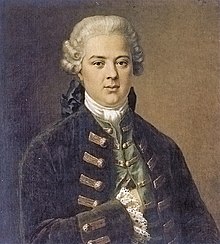

The Hanseaten (German: [hanzeˈaːtn̩], Hanseatics) is a collective term for the hierarchy group (so called First Families) consisting of elite individuals and families of prestigious rank who constituted the ruling class of the free imperial city of Hamburg, conjointly with the equal First Families of the free imperial cities of Bremen and Lübeck. The members of these First Families were the persons in possession of hereditary grand burghership (Großbürgerschaft) of these cities, including the mayors (Bürgermeister), the senators (Senatoren), joint diplomats (Diplomaten) and the senior pastors (Hauptpastoren). Hanseaten refers specifically to the ruling families of Hamburg, Lübeck and Bremen, but more broadly, this group is also referred to as patricians along with similar social groups elsewhere in continental Europe.
Since the Congress of Vienna in 1815, the three cities have been officially named the "Free and Hanseatic City of Hamburg" (Freie und Hansestadt Hamburg),[1][2] the "Free Hanseatic City of Bremen" (Freie Hansestadt Bremen) and the "Free and Hanseatic City of Lübeck" (Freie und Hansestadt Lübeck), the latter being simply known since 1937 as the "Hanseatic City of Lübeck". (Hansestadt Lübeck).[3]
Hamburg was one of the oldest stringent civic republics,[4] in which the Hanseatics preserved their constitutional privileges, which were granted in 1189 by Frederick I, Holy Roman Emperor, until the German Revolution of 1918–19 and the Weimar Constitution.[5] Hamburg was strictly republican, but it was not a democracy, but rather an oligarchy.
The Hanseaten were regarded as being of equal rank to the (landed) nobility elsewhere in Europe,[6] although the Hanseaten often regarded the (rural) nobility outside the city republics as inferior to the (urban and often more affluent, and in their own view, cultivated) Hanseaten. Thomas Mann, a member of a Lübeck Hanseatic family, portrayed this class in his novel Buddenbrooks (1901), principally for which he received the 1929 Nobel Prize for Literature.
- ^ The Hanseatic League ended about mid 17th century. J. Werdenhagen, De Rebus Publicis Hanseaticis Tractatus, Frankfurt 1641, was the first to use the term "Hanseatic", characterizing the Union between Hamburg, Bremen and Lübeck, created between 1630 and 1650 in lieu of the perished Hanse. Gerhard Ahrens, Hanseatisch, in: Schmidt-Römhild, Lübeck-Lexikon, 2006, with reference to: Rainer Postel: Hanseaten, Zur politischen Kultur Hamburgs, Bremens und Lübecks, in: Der Bürger im Staat 34 (1984), 153–158; Herbert Schwarzwälder, Hanseaten, hanseatisch, in Das Große Bremen-Lexikon, Bremen 2003, ISBN 3-86108-693-X
- ^ Following the Greater Hamburg Act, it was named the Hanseatic City of Hamburg (Hansestadt Hamburg) from 1938 until 1952 (constitution of 6 June 1952 Archived 18 June 2007 at the Wayback Machine), at which point it again became known as the Free and Hanseatic City of Hamburg (Freie und Hansestadt Hamburg)
- ^ Greater Hamburg Act; Lübeck lost in the "Lübeck-decision" (Lübeck-Urteil) on 5 December 1956 before the Federal Constitutional Court of Germany in its attempt to reconstitute its statehood
- ^ Nobles were banned since 1276 from living inside the city wall – Renate Hauschild-Thiessen, Adel und Bürgertum in Hamburg, in: Hamburgisches Geschlechterbuch, volume 14, Limburg an der Lahn 1997, p. XXII
- ^ The historical science assumes a timocratic or oligarchic character of Hamburg's constitution, being the reason why Hamburg at the Congress of Vienna was accepted by the princes of the German states as a member of the German Confederation – Peter Borowsky, Vertritt die "Bürgerschaft“ die Bürgerschaft? Verfassungs-, Bürger- und Wahlrecht in Hamburg von 1814 bis 1914, in: Schlaglichter historischer Forschung. Studien zur deutschen Geschichte im 19. und 20. Jahrhundert, Hamburg, p. 93)
- ^ Rudolf Endres. "Adel in der frühen Neuzeit". Enzyklopaedie Deutscher Geschichte. Vol. 18. Oldenbourg. p. 72.
© MMXXIII Rich X Search. We shall prevail. All rights reserved. Rich X Search
